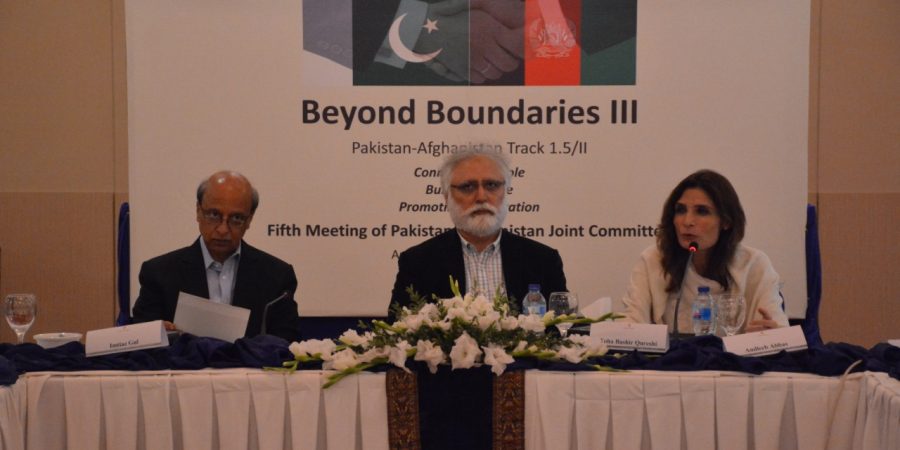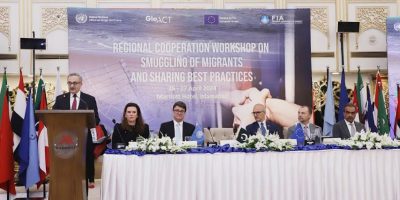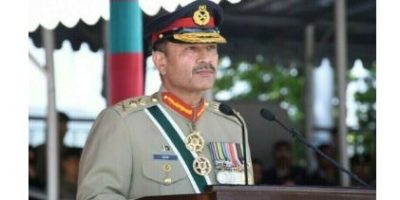Experts call for end to blame game for better Pak-Afghan ties

ISLAMBAD, AUG 21 (DNA) -:Hate does not end hate, only love can. Revenge cannot end revenge, only forgiveness can.
War cannot end war, only peace can. Let us rise above hate and revenge, Federal Parliamentary Secretary for Foreign Affairs and Member National Assembly of Pakistan Andleeb Abbas quoted Martin Luther King’s wordsat a high-level Pakistan-Afghanistan Track 1.5/II dialogue Beyond Boundaries convened by the Center for Research and Security Studies (CRSS) in Islamabad, urging both sides to focus on the positives first to mitigate negativity.
She was of the opinion that people to people linkages across the border are significantly good but political will has been missing for long at the state level.
Though, she optimistically stated that the power of the people is always more than the people in power. Hence, at the people’s level, there must be continued efforts towards peace and development.
A 13-member high-level Afghan delegation, headed by former Member of Afghan Parliament Khalid Pashtoon, landed in Islamabad to discuss bilateral relations with the Pakistani delegation of 13 members in a bid to devise recommendations to present to their governments.
Khalid Pashtoon urged all the delegates to stop digging into the blame game of the past and invited both sides to think of solutions of peaceful coexistence for the current and future generations.
Afghan Senator and Member of Afghanistan Cricket Board, Gulalai Noor Safi, stated that to further improve bilateral relations, security issues should not be allowed to impact the flow of trade, as seen in border closures, as it makes both the Pakistani and Afghan traders suffer and, consequently, makes the people in general bear the brunt.
Complementing her view, Mehnaz Akbar, Member of National Assembly of Pakistan, suggested to create a bilateral parliamentary group to continue debating issues that affect people on both sides.
Member of High Peace Council Laila Jaffari, from the Afghan delegation, affirmed the need to push both governments to implement the decisions taken under the APAPPS framework.
Further, she stated that the government of Pakistan should pressurize the Taliban to hold direct talks with the Afghan government who are the true representatives of Afghan people. Lt. Gen. (retd) Asif Yasin, former Defense Secretary, responded to the request in a positive manner and apprised the Afghan delegates that Pakistan is already using its full leverage in the Afghan peace talks.
The positive outcomes are visible; regional and international powers are also appreciating Pakistan’s role in lubricating the peace process, he explained. However, he maintained that Pakistan can only use its influence but does not have a decisive position. “You can bring the horse to the water but you cannot make it drink,” he said.
Khalid Pashtoon shared that some comments from the opposition leader in the National Assembly of Pakistan have hurt the feelings of the Afghan people.
He requested Pakistani politicians to try avoiding linking the Kashmir situation to Afghanistan. Pakistani politicians should be cautious in this regard, he said, asKashmir and Kabul are mutually exclusive domains.
Member of Afghan Parliament Kamal Safi was of the view that keeping the Torkham border open 24/7 will not help Afghans until Pakistan’s visa policy is “humanized.” Visa regulations and procedures will need to change to maximize the positive impacts ofthe Torkham crossing point to be open round the clock.
On the term “strategic depth” that came up in the discussion, Former Ambassador Asif Durrani commented thatstrategic depth was a non-sensical idea.
For now, there is no such thing; if it ever was, it is long dead, he said. Strategic depth comes from a stable space not from an unstable area.
After Pakistan and India became nuclear and missile states, such ideas simply vanished.
Former DG ISPR and Pakistan’s Ambassador to Ukraine, Maj. Gen. (retd) Athar Abbas, seconded the argument and asked the Afghan delegates for one valid reason how an unstable Afghanistan would benefit Pakistan. A stable Afghanistan has a positive spill-over effect for Pakistan and Pakistan wants nothing but an Afghan-led and Afghan-owned peace process for the people of Afghanistan.
At the end of the day-long dialogue, which was the 17th meeting of the Track II initiative, both groups formulated policy recommendations which will be shared with the Foreign Minister of Pakistan, Shah Mehmood Qureshi, in their meeting at the Ministry of Foreign Affairs.=DNA
=============
Related News

UNODC, Pakistan join hands to combat smuggling of migrants
ISLAMABAD, APR 26 /DNA/ – The Federal Investigation Agency (FIA) and the Ministry of ForeignRead More

Complete independence impossible without economic stability: COAS
RAWALPINDI, APR 26: Chief of Army Staff (COAS) General Asim Munir on Friday said thatRead More


Comments are Closed